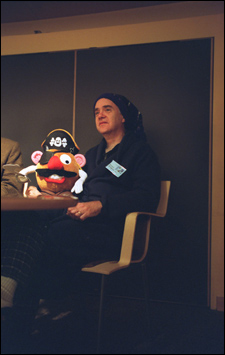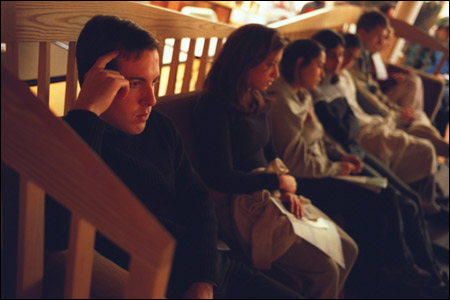Go to bed! say experts at pajama party panel
Sandman cometh, or not, depending on habits

They packed Ticknor Lecture Room in Boylston Hall, some wearing pajamas, some snuggling beneath blankets. They drank warm milk and ate cookies. They listened to soothing music.
But students jolted to alertness when they heard the message delivered at University Health Services’ “Why Sleep? A Pajama Party Panel” Wednesday evening (Dec. 3): Harvard students are not getting nearly enough sleep, and it’s taking a toll on their health and their academic performance.
“Your mothers were right,” said Robert Stickgold, assistant professor of psychiatry at Harvard Medical School. “If you don’t get sleep, you’ll get sick, you won’t learn as well.” While individuals vary slightly, most of us need eight hours of sleep per night for optimal health and peak performance.
Stickgold, who bravely addressed the crowd wearing pajamas, a nightcap, and slippers, joined sleep experts and Harvard Medical School (HMS) faculty members Charles Czeisler and John Winkelman for an eye-opening discussion of the latest sleep research and its bearing on the sleep – or lack thereof – of overworked Harvard students.
Czeisler, professor of medicine and chief of the Division of Sleep Medicine at Brigham and Women’s Hospital, outlined the factors that affect a person’s sleep cycle and level of alertness during the day. Our body’s internal clocks, which he called “circadian pacemakers,” work in concert with a system that monitors how long we’ve been awake, he said, in a surprising way. While one system tells us the longer we’ve been awake the sleepier we’re getting, our circadian pacemakers send out the strongest drive for wakefulness a few hours before bed. That’s because, unlike other mammals that sleep in bouts of naps, humans maintain long periods of sleeping and waking. We need that burst toward the end of our sleep or wakefulness to keep us going for the next few hours.
As long as we go to bed and rise at the same time each day, these two systems hum along smoothly. “But when we upset the apple cart and … try to pull an all-nighter, suddenly the two systems, instead of opposing each other and maintaining a high level of alertness, now both systems are sending out a strong drive for sleep,” said Czeisler. “It’s creating a critical zone of vulnerability for accidents.” Falling asleep at the wheel is the leading cause of fatal-to-the-driver accidents, Czeisler said.

To sleep, perchance to learn …
Not only might you run off the road without enough sleep, you’re probably not learning as well as you could, said Stickgold, who described the typical student sleep routine of skimping on sleep during the week and making it up on weekends or vacations as “sleep bulimia.” This binge-purge cycle is likely as detrimental to health as food bulimia is, he said.
To research sleep-dependent memory consolidation, Stickgold trained subjects in a laboratory on a visual task, then tested them on that task after a night of sleep. With six hours of sleep or less, he said, subjects showed no improvement on the task.
“But it gets worse,” he cautioned. If subjects got less than six hours of sleep the first night after the training but then slept all they wanted for the following two nights, they still showed no improvement. “If you don’t get sleep that first night after training on these tests, you lose it. You lose all the benefit of the training,” he said. “The sleep you have after you study might end up being as important to what you learn as the sleep you get before you study.”
‘But when we upset the apple cart and try to pull an all-nighter, suddenly the two systems, instead of opposing each other and maintaining a high level of alertness, now both systems are sending out a strong drive for sleep.’
– Charles Czeisler, Professor of medicine and chief of the Division of Sleep Medicine at Brigham and Women’s Hospital
Winkelman, who is assistant professor of psychiatry at HMS and associate director of the Sleep Disorders Program at Brigham and Women’s, brought a clinical perspective to the discussion of sleep. What happens, he asked, when you decide to go to sleep and you can’t?
Winkelman introduced the principles of “sleep hygiene” – not clean sheets or before-bed showers, but habits that promote a good night’s sleep. Get out of bed if you can’t sleep, he said, so that you don’t associate your bed with insomnia’s frustrating tossing and turning. “The bed is for two things,” he said, “if you’re lucky.”
He urged avoiding alcohol and caffeine for the several hours before bed (acknowledging that, in a Cain-and-Abel twist, his brother is marketing director for Starbucks), avoiding stressful activities before bed, and maintaining a regular sleep schedule.
Wake up, little Susie (and Sammy)
The experts admitted that their sage advice and groundbreaking research fights an uphill battle against a culture that sees sleep deprivation as necessary – and macho. Our culture’s current attitudes on sleep deprivation are analogous to our permissive views on drinking and driving in the 1960s, said Czeisler.
Bill Gates likes to brag that his Microsoft programmers can work through two nights to meet a deadline, said Stickgold. “The result, of course, is Windows,” he said.
Taking a more serious tack, Stickgold noted that Harvard fosters a culture of sleep deprivation, even adding late-night “Brain Breaks” to its standard meal plan to fuel students as they study into the night. “The University has to face up to the fact that they’re putting demands on students that exceed their capacity,” he said. “There aren’t enough hours in the day, so you take them out of the night.”
The panel touched a nerve with the students in the audience, most of whom lingered through the milk-and-cookies “cocktail hour” to pepper the researchers with questions. But will the expert opinions help Harvard’s sleep-deprived students change their habits?
“It seems hard for me to change anything, but I would like to,” said Peter Wood ’07, who estimated he gets less than six hours of sleep most nights. A football player, Wood doesn’t crack the books until practice and dinner are over, at about 8:30 at night. He’s exhausted in most of his lectures, he said. Still, the panelists’ advice was not entirely lost on him.
“The most important thing would be to try to establish a regular sleep schedule,” he said with resolve. “I find myself playing catch-up on the weekends. It’s probably doing me more harm than good.”
Kevin Koo ’07 also struggles to get enough sleep; he hits the pillow for five to six hours per night. “I probably could be performing better in my classes if I got more sleep,” he said, but more sleep is tough to come by. “Students here naturally strive for the best. There really aren’t enough hours in the day,” he said.
For all their wisdom and research, the experts sympathized with the students. Many students likely don’t even realize they’re not reaching optimal snoozing, they said.
“Sleep deprivation is like chronic pain,” said Stickgold. “After a while, it feels normal and you just learn to live with it.”




